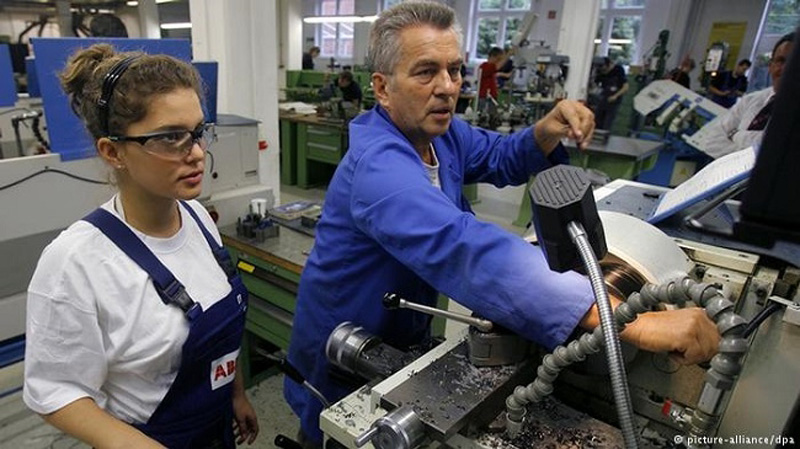
The German government on December 19 finalized a new immigration law that grants skilled workers from Non-European countries the opportunity to achieve permanent residence status in Germany.

A man and a woman work
on a machine in a factory.
The new law, which still requires the formal approval of the
German parliament, aims to make it easier for skilled workers from countries
that are not members of the European Union (EU) to immigrate to Germany.
The new immigration law for
skilled workers stipulates, among other things, that the hurdles for the
admission of workers from non-EU states are to be lowered. Qualified workers
should be allowed to come to Germany without an employment contract to seek a job.
Hitherto, this was only possible for university graduates.
The German economy is lacking
skilled workers, especially in small and medium-sized companies. According to a
study published by the German development bank KfW in November, 65 percent of
small and medium-sized companies in Germany fear that they cannot find the
appropriate candidates for their planned hiring of skilled workers over the
next three years.
Joerg Zeuner, chief economist
at KfW, said that Germany would undoubtedly need "many more qualified
immigrants in the coming years than before."
Ralph Brinkhaus, leader of the CDU parliamentary
faction, said that the law would be "a building block to better meet the
demand for qualified workers in the future".
Source: NDO
Many countries are grappling with rapidly aging population. As population aging becomes an irreversible global trend with significant impacts on economic and social sectors, nations face the urgent task of creating flexible policies to adapt to and make the most of this trend to build prosperous and sustainable societies.
With a series of stimulus measures, the world tourism industry is on the way to recovery as before the COVID-19 pandemic broke out. Facing the opportunity to take off, the "smokeless industry” is expected to strongly contribute to global economic growth while promoting potential and cohesion, contributing to peace and sustainable development.
The danger from the COVID-19 pandemic is still latent, threatening people’s health and lives in the context that the immunity provided from the COVID-19 vaccine has decreased. Many other dangerous diseases are also likely to break out when the global vaccination rate slows down, due to inequality in access to health services, vaccine hesitancy, and consequences of economic recession.
The Association of Southeast Asian Nations (ASEAN) is witnessing a rise in the sales of electric vehicles (EVs) in Vietnam, Malaysia and Indonesia, according to Maybank Investment Bank Research (Maybank IB Research).
The respect paying ceremony for Party General Secretary Nguyen Phu Trong continued on the morning of July 26 at the National Funeral Hall in Hanoi, with high-level delegations from foreign countries and international organisations paying their last respects and expressing deep condolences.
A wave of condolences have poured in from world leaders, international organisations, rulling parties, Communist parties and partner parties following the death of Vietnamese Party General Secretary Nguyen Phu Trong.



